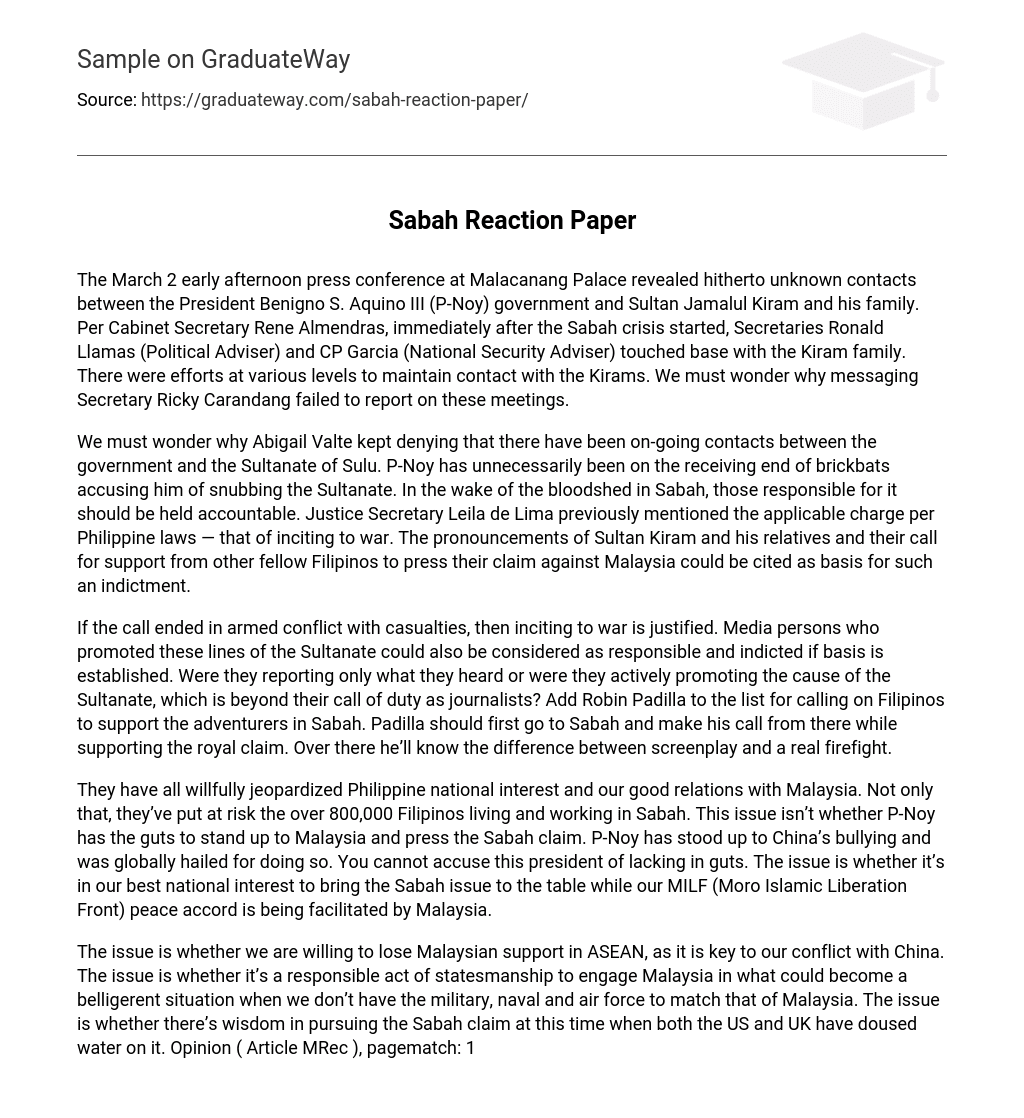During the March 2 press conference at Malacanang Palace, it was revealed that the government of President Benigno S. Aquino III (P-Noy) had previously undisclosed contacts with Sultan Jamalul Kiram and his family. Cabinet Secretary Rene Almendras disclosed that Secretaries Ronald Llamas (Political Adviser) and CP Garcia (National Security Adviser) reached out to the Kiram family immediately after the Sabah crisis began. There were ongoing efforts at various levels to maintain communication with the Kirams. It is puzzling why Secretary Ricky Carandang, responsible for messaging, did not report on these meetings.
We must question why Abigail Valte repeatedly denied any ongoing contacts between the government and the Sultanate of Sulu. As a result, P-Noy has faced unwarranted criticism of neglecting the Sultanate. In response to the violence in Sabah, those responsible should be held liable. Justice Secretary Leila de Lima has previously mentioned that inciting to war is a charge applicable under Philippine laws. The statements made by Sultan Kiram and his relatives, along with their plea for support from fellow Filipinos, could be used as evidence for this accusation.
If there was armed conflict and casualties resulting from the call, then inciting to war is justified. Media personnel who supported these ideas of the Sultanate could also be held accountable if there is evidence. Were they merely reporting what they heard or were they actively advocating for the Sultanate, which goes beyond their responsibilities as journalists? Include Robin Padilla in the list for urging Filipinos to assist the individuals in Sabah. Prior to making his plea, Padilla should visit Sabah and make his statement from there while substantiating the royal claim. In doing so, he will understand the distinction between a screenplay and an actual battle.
All of them have willingly endangered Philippine national interest and our good relations with Malaysia. Additionally, they have endangered the lives and livelihoods of over 800,000 Filipinos living and working in Sabah. The question at hand is not whether P-Noy has the courage to confront Malaysia and assert our claim on Sabah. P-Noy has already confronted China’s aggression and received global praise for doing so. We cannot accuse this president of lacking courage. The real question is whether it is in our best national interest to discuss the Sabah issue while Malaysia is facilitating the peace agreement with our MILF (Moro Islamic Liberation Front).
The discussion centers around the question of whether we should risk losing Malaysian support in ASEAN, which is crucial for our conflict with China. It is a matter of responsible statesmanship to consider engaging Malaysia in a potentially hostile situation when we lack the military, naval, and air force capabilities to match theirs. Additionally, it is worth questioning the wisdom of pursuing the Sabah claim at this time, especially since both the US and UK have discredited it. The decision to pursue a Sabah claim that has been undermined by historical events is also open for debate.
In 1977, it is believed that Dictator Ferdinand Marcos, possibly under pressure from the US, relinquished all of the Philippines’ claims to Sabah. Regardless of our opinions on the dictatorship, the Marcos government was recognized as the legitimate Philippine government at that time, and this action legally binds us to abandoning our claims to Sabah. That’s why we couldn’t refuse to repay the loans taken during the Marcos regime, despite some suggestions to do so in 1986. Additionally, in 1989, the Kiram family themselves admitted to retracting the 1962 ceding of the Sabah claim from the Philippine government. Therefore, there seems to be no grounds for further fighting over this matter.
This occupation of Sabah by Kiram has a historical parallel – the 1745 Scottish Jacobite Rebellion that occurred after Bonnie Prince Charles Edward Stuart returned to Scotland to claim the Scottish throne. Despite only having a shipload of arms and no French troops to support the rebellion, the clan chiefs advised Prince Charlie to return to France. However, Bonnie Prince Charlie responded by saying, “I am home.” Unfortunately, his homecoming resulted in the loss of Scottish lives. The 1745 Jacobite Rebellion concluded with a Scottish defeat at the Battle of Culloden.
Ruthless persecution followed the Battle of Culloden, forever changing the Scottish clan system. The events of 1603, specifically the Union of the Crowns, played a significant role in the formation of the United Kingdom. Prince Charlie’s failure to understand history led to the tragedy of Culloden and its aftermath of persecution. This could have been prevented if he had recognized which events were irreversible. Not only did his misadventure fail to alter Scottish history, but it also nearly destroyed Scottish culture. Similar caution should be taken with Sabah, as investing national goodwill and foreign relations for its pursuit would be unwise. It is already wasteful to spend time and energy on fool’s gold, but shedding precious Filipino blood for it is unforgivable. Let us not allow emotion to lead us down the same path as Bonnie Prince Charlie, who had mere dreams but little else to achieve them. Instead, we should focus on the other promising opportunities that lie ahead.





